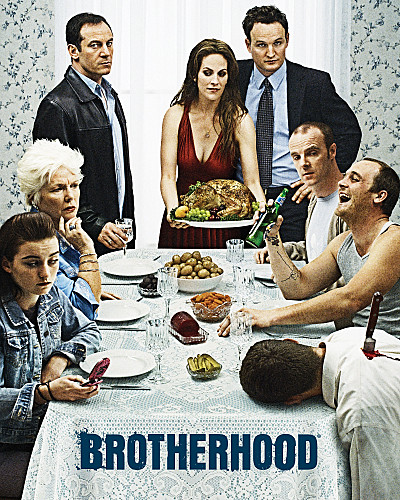
I know, I know, I know. Where the hell have I been? I wish I had an interesting answer for that, but I don't, so best to move on and talk movies. Well, and television.
In my eyes, Brotherhood is arguably one of the best shows on television now. If you're a fan of The Wire, Homicide or anything in that vein, you'll find Brotherhood serves you well. Now in the early stages of its third season, Brotherhood -- set in the fictional Rhode Island town known as "The Hill" -- tells the tale of two brothers: thug-with-a-heart Michael Caffee and his younger sibling Tommy, who's a local representative and slowly inching closer and closer to corruption. The series poses interesting questions about morality, family and friendship, and the inherent responsibilities that come with each. Is a mobster bad if he does some nice things? Is a politician good even though he skims from the top?
I recently re-watched the show's second season in anticipation of the new episodes, so I'll focus on those. Reviewing an entire show is a bit trickier than a movie, as you have hours upon hours of viewing to disseminate and digest, but I'll give it a try.
Brotherhood builds upon a relatively predictable concept ("They're brothers! And they're not totally good people!!") by injecting a collection of conflicted and complicated characters -- from Tommy's adulterous but doting wife, to the prickly and conspiratorial matriarch Rose, Brotherhood has nary a boring person onscreen, and the episodes and scenes rarely scream of filler or space-fillers. As I watched episode upon episode, though, I found myself gravitating more toward gangster brother Michael, who while a murderer and all-around "bad" guy, was the most consistent and likable of the bunch.
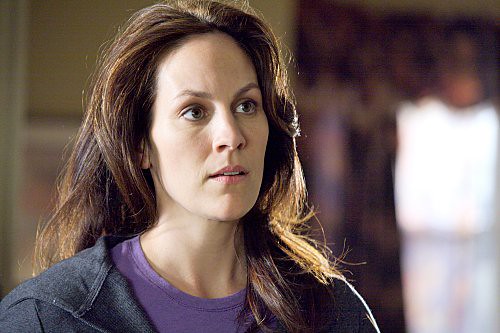
The main plot threads that carry season two are fairly basic, but engrossing enough. Tommy continues his bid for more power in the state House, while dealing with a crumbling marriage and temptations outside of it. Michael is recovering from a brutal beating suffered at the close of season one and is dealing with the side effects, both medical and career-wise. As Tommy amps up his political clout for a reelection campaign, Michael plays his friends and the cops investigating his criminal organization against each other in an effort to not only weed out those responsible for his injuries, but also to eliminate resident crime boss Freddie Cork, who Michael suspects is in some way connected to the assault that has left him dealing with blackouts and random memory loss.
The two plot threads converge on multiple levels, as we learn toward the end of the season that Tommy could have helped his criminal brother avoid being viciously attacked and his dalliances with a fringe politico get him into trouble with his family.
Jason Isaacs and Jason Clarke, playing Michael and Tommy, respectively, give nuanced and powerful performances as the siblings. There are no clear-cut "good guys" or "bad guys" on the show, merely people dealing with complicated issues and equally complicated friends and family members. Special props should go to Annabeth Gish, for her strong portrayal of Tommy's wife Eileen, who while repenting for her own marital transgressions discovers an inner strength and motivation that went unseen during the first season. While at times painfully annoying in the way only mothers can be, Fiona C. Erickson does a fine job of portraying an aging mother losing her grasp on her children, friends and, inevitably, her own youth. Former teen star Ethan Embry is also surprising as Declan, a talented cop driven to alcoholism and self-destruction when his marriage also begins to fall apart -- among other things I'm hesitant to spoil in this space.
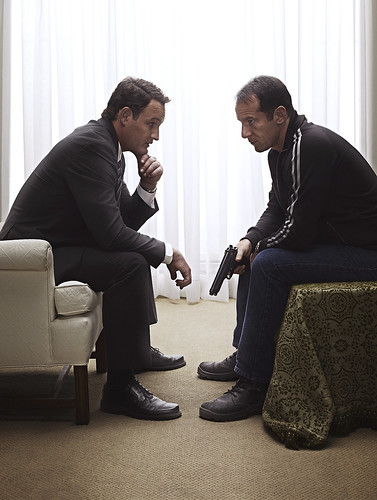
Brotherhood is the kind of show fans of seriously serialized and thoughtful television can sink their teeth into. Yes, you have to watch the previous episode to understand what's going on. Yes, there are more grays than black and whites. Yes, not everything is explained right away. But that's a good thing. Brotherhood carries the torch previously lifted by the classic shows I mention above, and it's only getting better. A
You can catch season three of Brotherhood on Showtime, Sunday nights at 8pm EST.
A few other shows you might want to consider, if you're looking to fill up your TiVo season pass list:
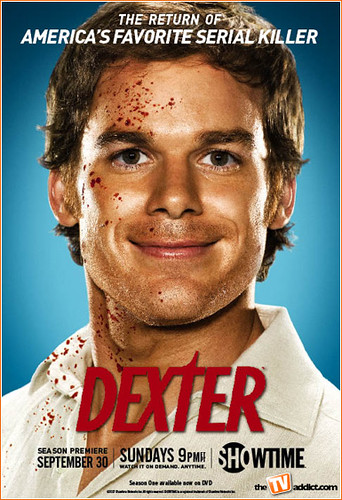
Dexter: I'm not totally sold on Dexter, I have to say. Everything seems to be there -- crime investigation, serial killers, Miami, mystery -- but the pieces don't really add up to a compelling whole. I'm still not sure why I'm supposed to like Dexter, who rarely even acts human during most scenes and then is suddenly a poster boy for psychosis in others. I mean, I get the big picture -- he's a serial killer that kills the really bad people. But, uh, still. Doesn't work for me. And, being a Miami native makes watching the show a bit painful, since it looks nothing like Miami and the scene dressing used to make interiors and restaurants seem "authentic" just comes off as cheesy and poorly researched. Ditto on Lt. La Guerta's "Cuban" accent. Plus, Dexter's sister, apparently a detective in the same police department Dex works at, is annoying and not very interesting. Same goes for grating characters like pudgy sergeant Angel, who has arguably the worst dialogue on the show. Still, I keep watching, thinking it'll go from mediocre to decent. Fingers crossed. C+
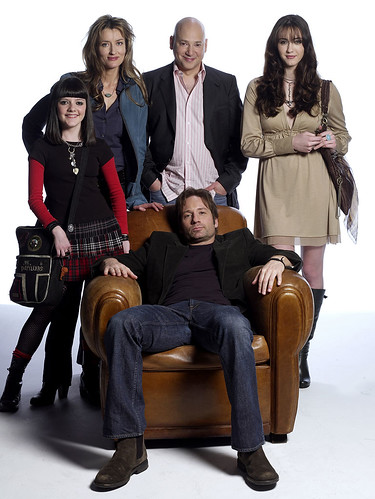
Californication: This is a fun show, on a number of levels. David Duchovny plays Hank Moody, a one-time lauded novelist who's hit the dumps since he moved to L.A. to embrace the big life: His longtime lover and child left him, he can't write and despite the constant presence of beautiful women everywhere, Hank can't seem to find happiness at the bottom of the bottle. Duchovny does a great job of playing the lovable asshole -- sleeping around, drinking himself into oblivion, but still longing for that one, true love he let slip through his fingers. Madeleine Martin is great as Hank's tween kid Becca, who serves as the show's voice of reason and comic relief. While at times I find Hank's antics to be a bit much and bordering on the unforgivable, his strong and very real dynamic with Karen makes for good viewing, and keeps me coming back. A-






6 comments:
I've got the first season of Dexter sitting on my desk at home - it came with glowing recommendations from Cake Man, Kennon, and of all people my mother. It's really hard for me to get into a TV series... once I'm started I can burn through them in no time. It's just the matter of starting it!
Without Lost, I'm only watching House regularly at the moment, so I desperately need some new TV. If only AMC would restart the second season of Mad Men...
It's not bad, really, it's just not really that good. I think people get overwhelmed by the concept, because it is pretty cool -- getting inside a serial killer's head. But Dexter doesn't really act like most serial killers have acted in the real world, and his eventual evolution into this kind of weird, Punisher-type character that only kills bad people just seemed dumb. Why not go all out and make the guy a serial killer who just HAS to kill? I'd find that infinitely more interesting.
I agree with KS that a serial killer who just has to kill and doesn't limit himself to the bad guys would be way more interesting. It would also be harder though, and over the course of the show we have to like Dexter on some level. I haven't seen much of the show, but I feel like he's sort of a good bad guy. By making the character more real and at times all bad, you run a greater risk of losing audience support for your character.
Kind of makes me think of the serial killer Cake Man wrote. He was a good serial killer and acted like a serial killer should, but he was just TOO much of a serial killer. He was a really really bad guy and I don't think anybody wanted to stand behind him as the protagonist for the script. Authenticity is important, but you definitely have to find the balance.
I also find how the show portrays the city and residents to be really cheesy and uninformed -- I find myself wondering if the creators had even been to Miami.
As for making Dexter more evil, I think that could work if he had an interesting supporting cast, as opposed to a collection of one-note characters, like his "angry, dedicated cop" sister, or his bland, way-too-nice girlfriend/fiance. Still, I keep watching the show, so it must be doing something right.
I actually really enjoyed Dexter Season 1 (all I've seen, so far, but Season 2 is on my Netflix Queue). I bought it during a 40% off sale, and really found it to be worth the $23 I paid for it. Not having Showtime or HBO or anything like that, I tend to the miss most talked about shows when they're just airing. During the writers strike, you'll remember, ABC (I think) aired Dexter (or was it CBS?), albeit in a much edited fashion. I have to say, I've tried Rome and The Wire and a few other shows recently. Of them, Dexter was the one that hooked me most from the get-go.
It's ok to like bad television, Cake Man.
But seriously -- yeah, I can see why some people like the show. It just seems too easy and paint-by-numbers sometimes. There doesn't seem to be much depth to the characters and/or the storytelling.
Post a Comment